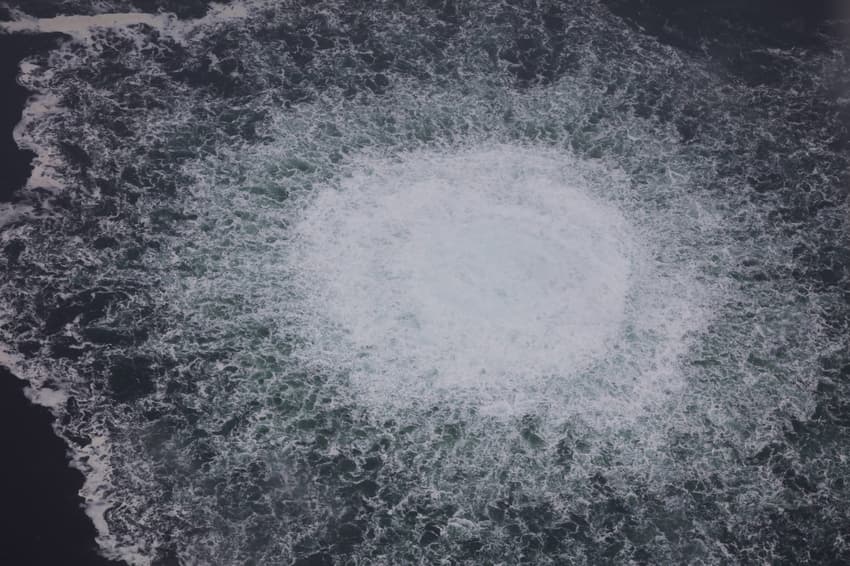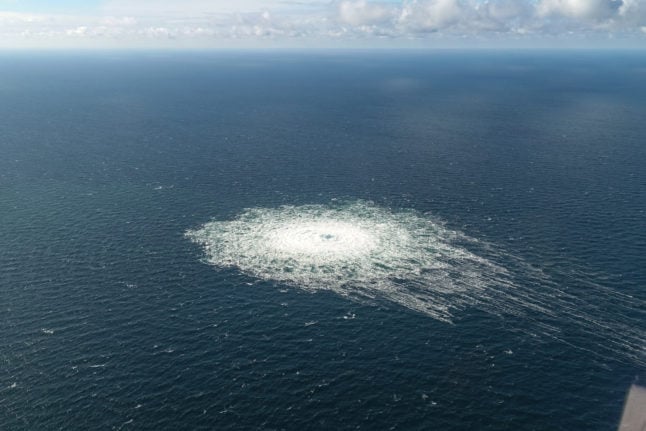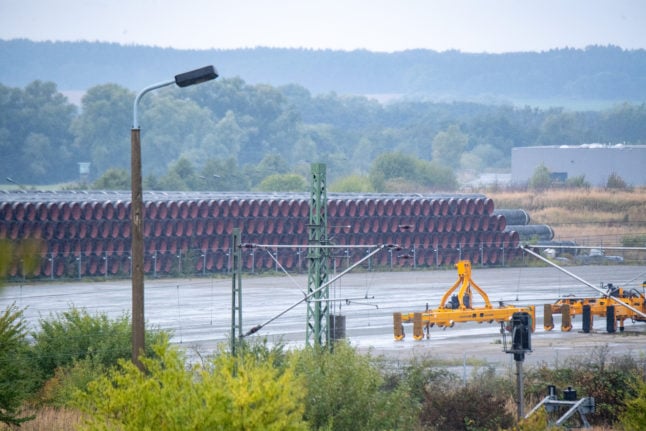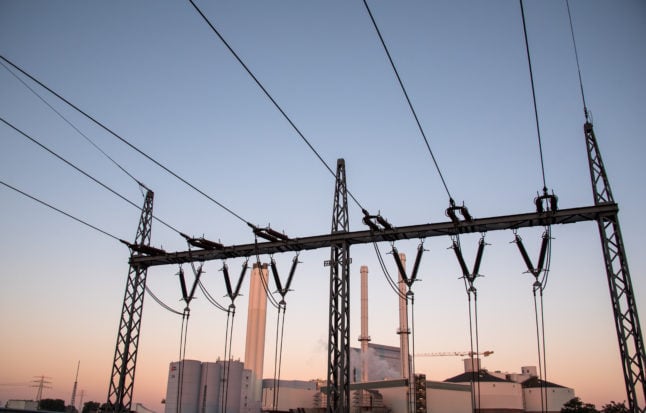What the Nord Stream pipeline leaks mean for people in Germany

Security experts are increasingly convinced that leaks in the Nord Stream pipelines are the result of sabotage. Could there be further attempts to damage infrastructure - and what would the consequences be for people in Germany?
What's going on?
Earlier this week, Swedish and Danish authorities reported three unexplained leaks in the two Nord Stream gas pipelines running between Russia and Germany. It came after a dramatic drop-off in pressure had been registered in both Nord Stream 1 and Nord Stream 2 on Monday night, reducing the capacity of the pipelines to zero.
On Tuesday, the Danish military published videos showing huge circles of gas bubbling to surface of the Baltic Sea - in some cases, stretching up to a kilometre in diameter.

A video released by the Danish authorities shows gas bubbling up in the Baltic Sea. Photo: picture alliance/dpa/Danish Defence Command | -
Then, on Thursday morning, the Swedish coast guard reported yet another pipeline leak, suggesting that the damage to the pipelines may be greater than previously imagined.
"There are two leaks on Swedish territory and two on Danish territory," a Swedish coast guard official told the AFP news agency on Thursday.
The leaks are located near the Danish island of Bornholm in the Swedish and Danish economic zones but in international waters.
What's behind the leaks?
The discovery of the damage has caused widespread concern in the European Union that critical infrastructure is being targeted by hostile actors.
Though investigations are still ongoing, Danish authorities have reported explosions in the affected areas shortly before the leaks were discovered.
Both EU authorities and the NATO defence alliance are assuming that the leaks - and explosions - are the result of deliberate sabotage.
"As far as I can tell, it is a very intelligent attack that could not have been perpetrated by a normal group of people," EU Home Affairs Commissioner Ylva Johansson said on Wednesday evenings, adding that there was a high risk that a state could be responsible. "We have suspicions, of course. But it is too early to judge that conclusively."
READ ALSO: Who is behind the Nord Stream Baltic pipeline attack?
Military experts have been slightly less reserved in apportioning blame for the destruction, with several looking to Russia as the most likely perpetrator of the attacks.
"Leaks in gas pipelines are extremely rare," Norwegian naval officer and military expert Tor Ivar Strömmen told AFP. Both the Nord Stream pipelines are both new and highly robust, he said.
"I see only one possible actor, and that is Russia," Strömmen added.
Meanwhile, Michael Giss, a naval commander in the German Bundeswehr (army), pointed to the fact that Russia's sham referendums in occupied eastern regions of Ukraine and the likely attacks on the Nord Stream pipelines occurred on the same day.
"We also know that there are drones in the Russian navy - or even small submarines - that could be used for such purposes," Giss told Tagesschau. "I also don't want to exclude the possibility that certain measures may have been taken in advance during the construction of the pipeline to trigger such an event."
The motivation could be to unsettle an already nervous Europe and drive gas prices even higher, experts believe.
Has this affected gas deliveries to Germany?
So far, gas deliveries haven't been impacted by the damage to the pipeline - though the leaks have rendered both of the pipelines inoperable.
The gas supply hasn't been affected because neither of the Nord Stream pipelines are currently in service. At the start of September, Russia cut all gas deliveries to Germany via the Nord Stream pipeline in what is widely seen as retaliation for western sanctions against Russia over the war in Ukraine.
In the case of the recently completed Nord Stream 2, the pipeline has never been in operation: Germany took the decision not to receive gas through the pipeline just days after Russia launched its full-scale invasion of Ukraine.
Nevertheless, both pipelines contained gas at the time of the leaks: Nord Stream 1 is likely to have had residual gas from previous deliveries while Nord Stream 2 was likely filled after completion for testing purposes or as a way to place political pressure on Germany to put the pipeline in operation.
READ ALSO: Germany says must brace for ‘unimaginable’ after gas leaks

Unused parts for the Nord Stream 2 pipeline in Mecklenburg Western-Pomerania. Photo: picture alliance/dpa | Stefan Sauer
Has this impacted energy prices?
Prices for natural gas have risen significantly in the European energy markets this week. On Tuesday, shortly after the first leaks were discovered, gas prices shot up from €167 per megawatt hour to €182 per megawatt hour.
By Wednesday, TTF futures contracts for Dutch natural gas - which represent trends in the EU market as a whole - had gone up to €212 per megawatt hour for deliveries in October and to €234 per megawatt hour for deliveries in January. This marks an increase of 14 percent and 11 percent respectively.
However, gas prices still aren't anywhere near their previous peak in August, when TTF contracts soared to €346 per megawatt hour. Experts also believe that the latest hikes aren't likely to last.
That's partly because most European countries have succeeded in filling up their gas reserves in preparation for winter.
In Germany, which has the largest gas storage capacity in Europe, the gas storage facilities were around 91.5 percent full on September 27th. The government hopes to fill the facilities to at least 95 percent of capacity by November 1st.
To relieve citizens and businesses, the government is also working to introduce a gas price cap in the coming weeks. That would likely see households pay a capped rate for a certain amount of energy per year, with anything above that subject to market rates.
This would shield people from the worst of the price rises, even if Russia carries through on its latest threat to shut off gas deliveries via the Ukraine.
German politicians are debating how this would be paid for.
READ ALSO: German regional leaders call for energy price cap
Could there be more attacks in future?
The fact that a potential attack on critical infrastructure was able to slip under the radar is a major concern. It has raised fears that other parts of critical infrastructure, including electricity cables, other gas pipelines and internet cables could be subject to future sabotage attempts, which would have a huge impact on people's lives.
One particularly worrying target is the some 1000km of underwater cables that deliver electricity from Finland to Germany via the Baltic Sea, experts believe.
According to NATO security expert David van Weel, critical infrastructure like this has become a major target for cybercriminals and hostile states. Analysts have been warning for years that China and Russia are conducting spy operations to assess the undersea infrastructure of NATO countries.
Beyond gas, supplies of drinking water and electricity, internet connectivity could also be under threat.

Electricity cables deliver power to a factory in Hamburg. Photo: picture alliance/dpa | Daniel Bockwoldt
There are currently around 400 undersea cables with a length of around 1.3 million kilometres that connect countries across the globe. If these were sabotaged, the consequences for communication and the economy could be disastrous.
After the Nord Stream pipeline leaks, NATO forces - including the German Bundeswehr - are increasing their presence around this vital infrastructure with additional patrols.
The EU is also working on implementing measures to protect the drinking water, electricity and other vital infrastructure in its member states.
The initiative was started in summer and is set to be accelerated in light of the pipeline leaks.
Comments
See Also
What's going on?
Earlier this week, Swedish and Danish authorities reported three unexplained leaks in the two Nord Stream gas pipelines running between Russia and Germany. It came after a dramatic drop-off in pressure had been registered in both Nord Stream 1 and Nord Stream 2 on Monday night, reducing the capacity of the pipelines to zero.
On Tuesday, the Danish military published videos showing huge circles of gas bubbling to surface of the Baltic Sea - in some cases, stretching up to a kilometre in diameter.

Then, on Thursday morning, the Swedish coast guard reported yet another pipeline leak, suggesting that the damage to the pipelines may be greater than previously imagined.
"There are two leaks on Swedish territory and two on Danish territory," a Swedish coast guard official told the AFP news agency on Thursday.
The leaks are located near the Danish island of Bornholm in the Swedish and Danish economic zones but in international waters.
What's behind the leaks?
The discovery of the damage has caused widespread concern in the European Union that critical infrastructure is being targeted by hostile actors.
Though investigations are still ongoing, Danish authorities have reported explosions in the affected areas shortly before the leaks were discovered.
Both EU authorities and the NATO defence alliance are assuming that the leaks - and explosions - are the result of deliberate sabotage.
"As far as I can tell, it is a very intelligent attack that could not have been perpetrated by a normal group of people," EU Home Affairs Commissioner Ylva Johansson said on Wednesday evenings, adding that there was a high risk that a state could be responsible. "We have suspicions, of course. But it is too early to judge that conclusively."
READ ALSO: Who is behind the Nord Stream Baltic pipeline attack?
Military experts have been slightly less reserved in apportioning blame for the destruction, with several looking to Russia as the most likely perpetrator of the attacks.
"Leaks in gas pipelines are extremely rare," Norwegian naval officer and military expert Tor Ivar Strömmen told AFP. Both the Nord Stream pipelines are both new and highly robust, he said.
"I see only one possible actor, and that is Russia," Strömmen added.
Meanwhile, Michael Giss, a naval commander in the German Bundeswehr (army), pointed to the fact that Russia's sham referendums in occupied eastern regions of Ukraine and the likely attacks on the Nord Stream pipelines occurred on the same day.
"We also know that there are drones in the Russian navy - or even small submarines - that could be used for such purposes," Giss told Tagesschau. "I also don't want to exclude the possibility that certain measures may have been taken in advance during the construction of the pipeline to trigger such an event."
The motivation could be to unsettle an already nervous Europe and drive gas prices even higher, experts believe.
Has this affected gas deliveries to Germany?
So far, gas deliveries haven't been impacted by the damage to the pipeline - though the leaks have rendered both of the pipelines inoperable.
The gas supply hasn't been affected because neither of the Nord Stream pipelines are currently in service. At the start of September, Russia cut all gas deliveries to Germany via the Nord Stream pipeline in what is widely seen as retaliation for western sanctions against Russia over the war in Ukraine.
In the case of the recently completed Nord Stream 2, the pipeline has never been in operation: Germany took the decision not to receive gas through the pipeline just days after Russia launched its full-scale invasion of Ukraine.
Nevertheless, both pipelines contained gas at the time of the leaks: Nord Stream 1 is likely to have had residual gas from previous deliveries while Nord Stream 2 was likely filled after completion for testing purposes or as a way to place political pressure on Germany to put the pipeline in operation.
READ ALSO: Germany says must brace for ‘unimaginable’ after gas leaks

Has this impacted energy prices?
Prices for natural gas have risen significantly in the European energy markets this week. On Tuesday, shortly after the first leaks were discovered, gas prices shot up from €167 per megawatt hour to €182 per megawatt hour.
By Wednesday, TTF futures contracts for Dutch natural gas - which represent trends in the EU market as a whole - had gone up to €212 per megawatt hour for deliveries in October and to €234 per megawatt hour for deliveries in January. This marks an increase of 14 percent and 11 percent respectively.
However, gas prices still aren't anywhere near their previous peak in August, when TTF contracts soared to €346 per megawatt hour. Experts also believe that the latest hikes aren't likely to last.
That's partly because most European countries have succeeded in filling up their gas reserves in preparation for winter.
In Germany, which has the largest gas storage capacity in Europe, the gas storage facilities were around 91.5 percent full on September 27th. The government hopes to fill the facilities to at least 95 percent of capacity by November 1st.
To relieve citizens and businesses, the government is also working to introduce a gas price cap in the coming weeks. That would likely see households pay a capped rate for a certain amount of energy per year, with anything above that subject to market rates.
This would shield people from the worst of the price rises, even if Russia carries through on its latest threat to shut off gas deliveries via the Ukraine.
German politicians are debating how this would be paid for.
READ ALSO: German regional leaders call for energy price cap
Could there be more attacks in future?
The fact that a potential attack on critical infrastructure was able to slip under the radar is a major concern. It has raised fears that other parts of critical infrastructure, including electricity cables, other gas pipelines and internet cables could be subject to future sabotage attempts, which would have a huge impact on people's lives.
One particularly worrying target is the some 1000km of underwater cables that deliver electricity from Finland to Germany via the Baltic Sea, experts believe.
According to NATO security expert David van Weel, critical infrastructure like this has become a major target for cybercriminals and hostile states. Analysts have been warning for years that China and Russia are conducting spy operations to assess the undersea infrastructure of NATO countries.
Beyond gas, supplies of drinking water and electricity, internet connectivity could also be under threat.

There are currently around 400 undersea cables with a length of around 1.3 million kilometres that connect countries across the globe. If these were sabotaged, the consequences for communication and the economy could be disastrous.
After the Nord Stream pipeline leaks, NATO forces - including the German Bundeswehr - are increasing their presence around this vital infrastructure with additional patrols.
The EU is also working on implementing measures to protect the drinking water, electricity and other vital infrastructure in its member states.
The initiative was started in summer and is set to be accelerated in light of the pipeline leaks.
Join the conversation in our comments section below. Share your own views and experience and if you have a question or suggestion for our journalists then email us at [email protected].
Please keep comments civil, constructive and on topic – and make sure to read our terms of use before getting involved.
Please log in here to leave a comment.